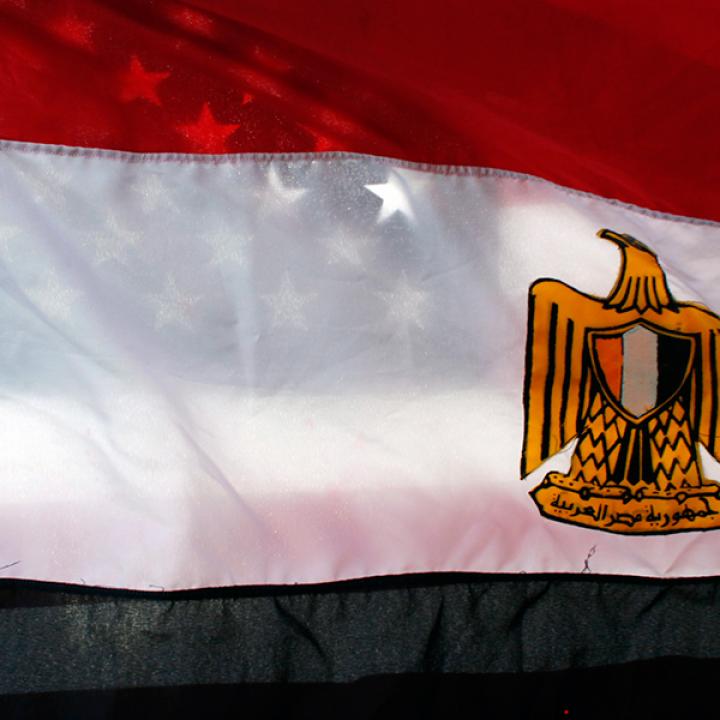
- Policy Analysis
- Articles & Op-Eds
Making the Most of Limited U.S. Leverage in Egypt

Although Washington cannot dispel the existential fight between the military and the Brotherhood, it can exert influence in other ways.
Washington's confusion about the rapidly worsening events in Egypt is understandable. The Muslim Brotherhood's yearlong, stunningly inept attempt to consolidate total power has given way to a new military-backed government that appears inclined to do the same -- albeit with far better arms. American policy makers are once again wringing their hands over what to do; specifically, whether to cut off $1.3 billion in annual military aid.
According to U.S. law, foreign aid must be cut off to any country after a coup. So some worry that by not withdrawing aid from Egypt following what was, technically speaking, a military coup, Washington is sending the message that American law doesn't matter. Many also fear that continuing military aid will reflect -- for the umpteenth time -- a lack of American seriousness about promoting democracy in Egypt.
While these concerns are well taken, they incorrectly depict military aid as a mechanism for showcasing American values, rather than what it actually is: a tool for maintaining leverage with the Egyptian military to cooperate in promoting U.S. interests.
That's not to say that a more democratic Egypt, with an effective civilian government, isn't an important American interest and vital to Egypt's long-term domestic stability. But the U.S. doesn't have full leverage with the Egyptian military to achieve these ends. The leverage exists only on matters that are less important to the Egyptian military than the F-16 fighter jets, Abrams tanks and prestige that comes with owning these weapons systems. The U.S. has little power to influence matters that are of life-or-death importance to the generals.
For instance, the fact that Egypt's generals responded to mass protests by removing President Mohammed Morsi from power means that the current fight between the military and Muslim Brotherhood is existential. The generals believe that they must, at the very least, decapitate the Brotherhood by prosecuting its top leadership so it cannot return to power. Failing to do so, they believe, would threaten the generals' lives and perhaps the broader military. The Brotherhood is inclined to keep fighting because it believes such conflict will create fissures in the military and cause the generals' downfall -- the Brotherhood's only chance of regaining the authority it believes the military stole.
Washington cannot alter this basic dynamic. That's why requests for Mr. Morsi's release -- which Defense Secretary Chuck Hagel reportedly made to his Egyptian counterpart multiple times last month -- are futile. They also make Washington look weak when such requests inevitably are rejected. When Sens. John McCain (R., Ariz.) and Lindsey Graham (R., S.C.) raise the prospect of directing international pressure toward liberating top Brotherhood leaders, Washington sends a deeply misguided signal. It suggests the Brothers should keep fighting for something to which the generals will never accede, thereby raising the prospects of sustained violence.
Washington should not demand that the Brotherhood join the coming political process. Its participation would constitute an acknowledgment of the legitimacy of Mr. Morsi's ouster, and the Brotherhood will not do this on principle -- at least not yet.
So where can Washington use its leverage? What issues are not life-or-death for Egypt's generals, and can thus be influenced by U.S. diplomacy? Here are three suggestions.
First, Washington should insist that the military give the current civilian government sufficient space to govern. This includes letting the government enact economic reforms that may be unpopular but are vital to Egypt's long-term stability. It means allowing the government to make crucial changes in the notoriously abusive Interior Ministry's policing protocol and to streamline Egypt's sprawling bureaucracy. Washington can use its leverage by telling the generals that failing to live up to their promise to empower this civilian government would make it politically impossible for the U.S. to ignore that a military coup has taken place, and would thereby make aid suspension hard to avoid.
Second, the U.S. should insist that the military and security forces deal with the Brotherhood's protests through containment instead of crackdown. Responding to violent instigations and preventing these protests from invading major thoroughfares is one thing; launching an all-out assault on demonstrators, as the military has signaled it intends to do, is quite another. Washington can tell the generals that each incident in which scores of Mr. Morsi supporters are killed makes our foreign aid policy that much harder to defend to the American people.
Third, Washington should insist that the political process, which will include drafting a new constitution and elections, be open to all forces that reject violence. This means leaving the option of political participation open to those Muslim Brothers who are not convicted of violent acts -- without staking the legitimacy of the process on their participation.
It also means insisting that the military make no attempt to re-create the restrictive political system that existed under Hosni Mubarak, as many analysts fear is in the offing. This would force excluded parties to conduct politics via other, more violent means. The Brotherhood will likely continue to choose martyrdom over politics for the foreseeable future. But smart policy would promote a democratic process that leaves an opening for cooler heads to emerge that might alter the Brotherhood's trajectory.
Eric Trager is the Wagner fellow at The Washington Institute.
Wall Street Journal



